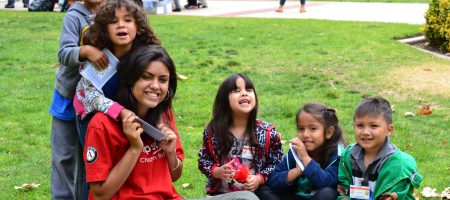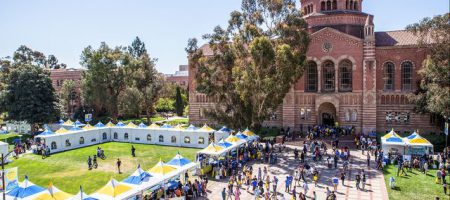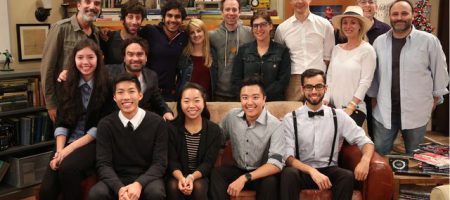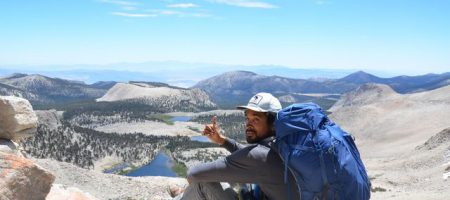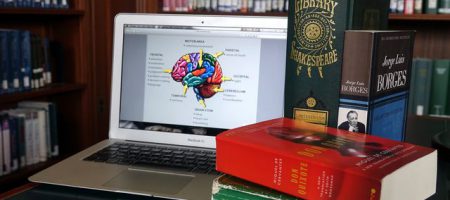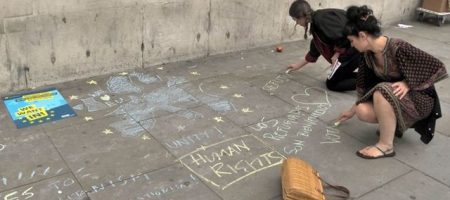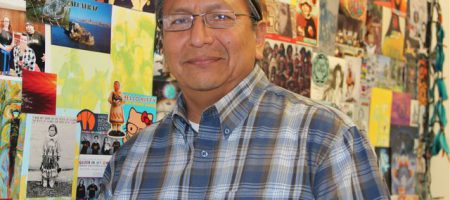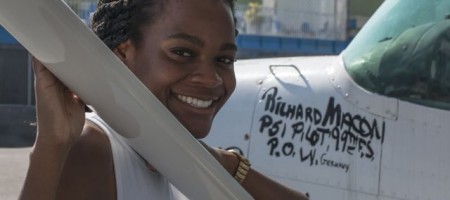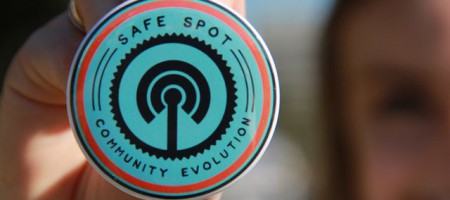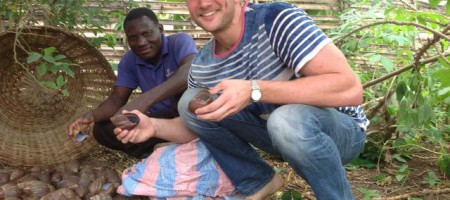UCLA hosts its biggest early education literacy fair
400 children and their families head to campus to celebrate literacy
Every spring Dickson Court rings with the rare laughter and shouts of preschool children chasing one other in a game of tag. UCLA students wearing bright red Jumpstart t-shirts with AmeriCorps logos can be seen reading to little children and painting colorful flowers and dragons on lit-up faces.
Parents and teachers look on, smiling as their little ones run up to them with arts and crafts projects they’ve made with their Jumpstart teacher. Along the perimeter of Dickson Court, professors and staff look briefly lost as they navigate around UCLA’s biggest early education literacy fair.
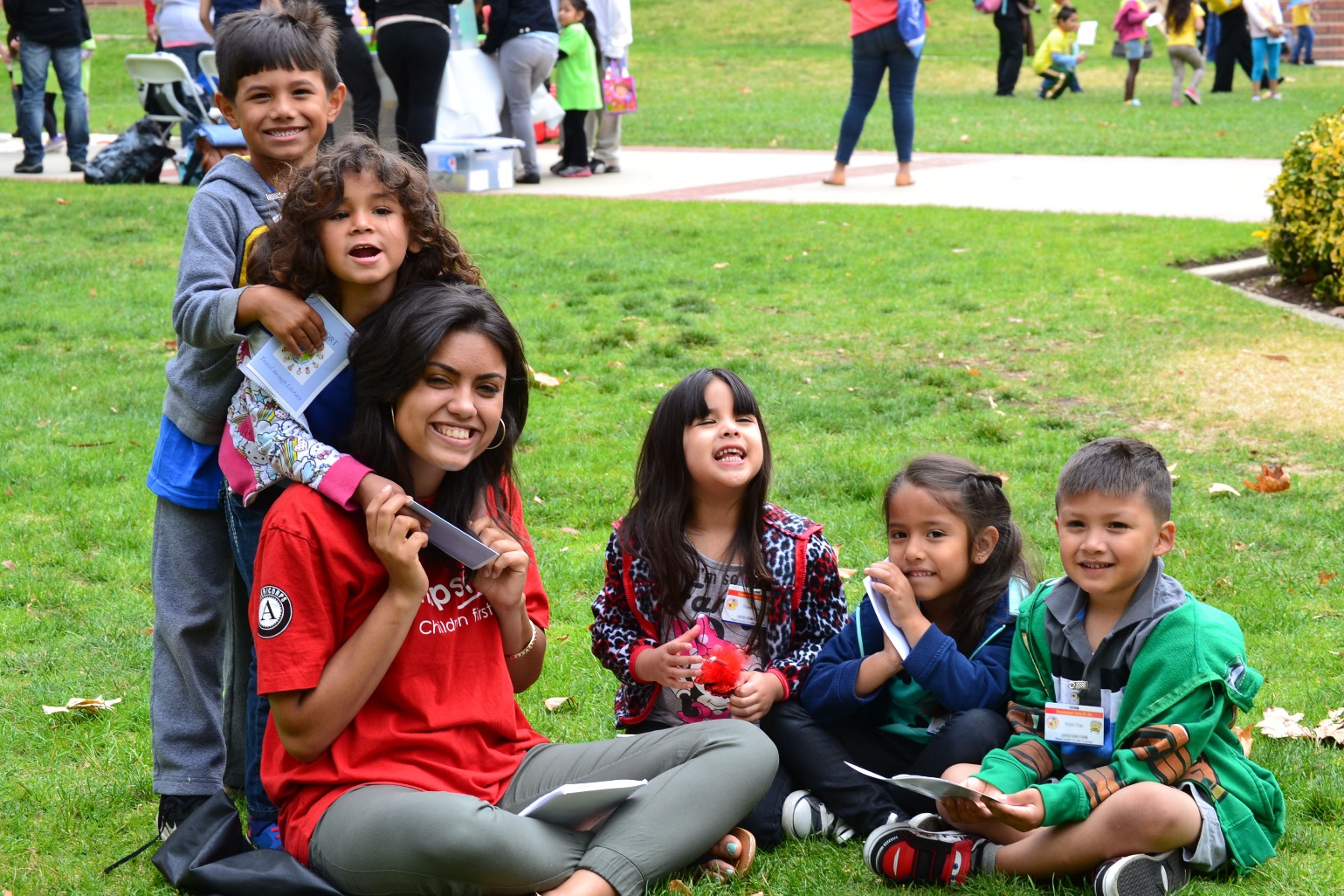
Rayna Jackson/Jumpstart Literacy Fair
This scene will be replayed at the third annual Jumpstart UCLA Literacy Fair on May 17. More than 400 preschool children, families and teachers from eight preschools are set to join UCLA students and staff in fun-filled games and interactive activities.
The event celebrates local preschoolers’ achievements and features various interactive literacy activities, all of which are free for the families in attendance. Jumpstart’s Senior Director of Programming for California, Truyen Truan, says that this campus event is a “top priority” and is what makes the UCLA Jumpstart program so unique.
“UCLA really feels that it is valuable to bring [Jumpstart] children and families to the campus so that the children can see where the corps members go to school,” Truan said. “Corps members instill in the children early-on that anything is possible and that they can be UCLA students one day.”
The upcoming literacy celebration is just one of the ways that Jumpstart UCLA connects with the local community. Throughout the academic year, AmeriCorps members in the program work in local low-income classrooms to help children develop language, literacy and social skills crucial for success in kindergarten and beyond.
Jumpstart UCLA: Where coursework meets community work
As a “super-site,” UCLA currently has two site managers and 80-85 corps members, who complete a total of 25,500 service hours each year. Working out of the UCLA Center for Community Learning, students travel to eight local preschools in Santa Monica, Venice, Los Angeles and Culver City to teach in classrooms in low-income neighborhoods.
Dr. Kathy O’Byrne, director at the UCLA Center for Community Learning, says that civic engagement programs like Jumpstart UCLA not only address social issues like literacy and poverty in Los Angeles, but are key to students’ undergraduate education.
“Students see firsthand the power of ‘learning by doing’ and thinking critically as hallmarks of a 21st century college education,” O’Byrne said. “By working in low-income communities of Los Angeles, students learn about issues of diversity, income inequality, and policy that impacts the futures of our preschoolers.”
It was the “hands-on” nature of the work-study program that caught the attention of Angelica Castro, a third-year political science major with a double minor in education and labor and workplace studies. For Castro, the idea of sitting behind a desk for a work-study job did not appeal to her. She was looking for a work experience that would give her the opportunity to work off-campus.
“Jumpstart UCLA gives me opportunity to get out into the local community and apply what I am learning in ‘theory’ from my education minor courses,” Castro said. “It has given me a better idea of the various issues in our education system and how I can help be a part of the solution to help students, who like me come from low-income and immigrant families.”
Growing up in Santa Maria, California, an agricultural community, Castro gained special insight into educational disparities facing immigrants and first-generation students. She saw that many of the kids she grew up with were placed in remedial courses and were rarely offered the necessary resources to graduate. The educational inequities she witnessed often derailed the academic ambitions of many of her peers growing up.
“Every student should have the opportunity to achieve their goals, but there is so much work to be done.” Castro said. “I want to go to graduate school for education and conduct research to find ways to ensure that in the future, the kids I work with will be a part of an education system that not only focuses on promoting equality, but equity as well.”
Although looking toward the future, students like Castro are working every day to remove literacy barriers for children in low-income neighborhoods, many of whom “start kindergarten 60 percent behind their peers from more affluent communities,” according to Jumpstart.
The Bessie and David Pregerson Child Development Center (BPCDC) is one site that partners with UCLA’s Jumpstart program. Located in Westwood, the BPCDC serves low-income children, 95 percent of whom are homeless. BPCDC is adjacent to a transitional village and sees many children who are part of families that ‘double-up,’ which is when four to five families share one house and each family lives in one room.
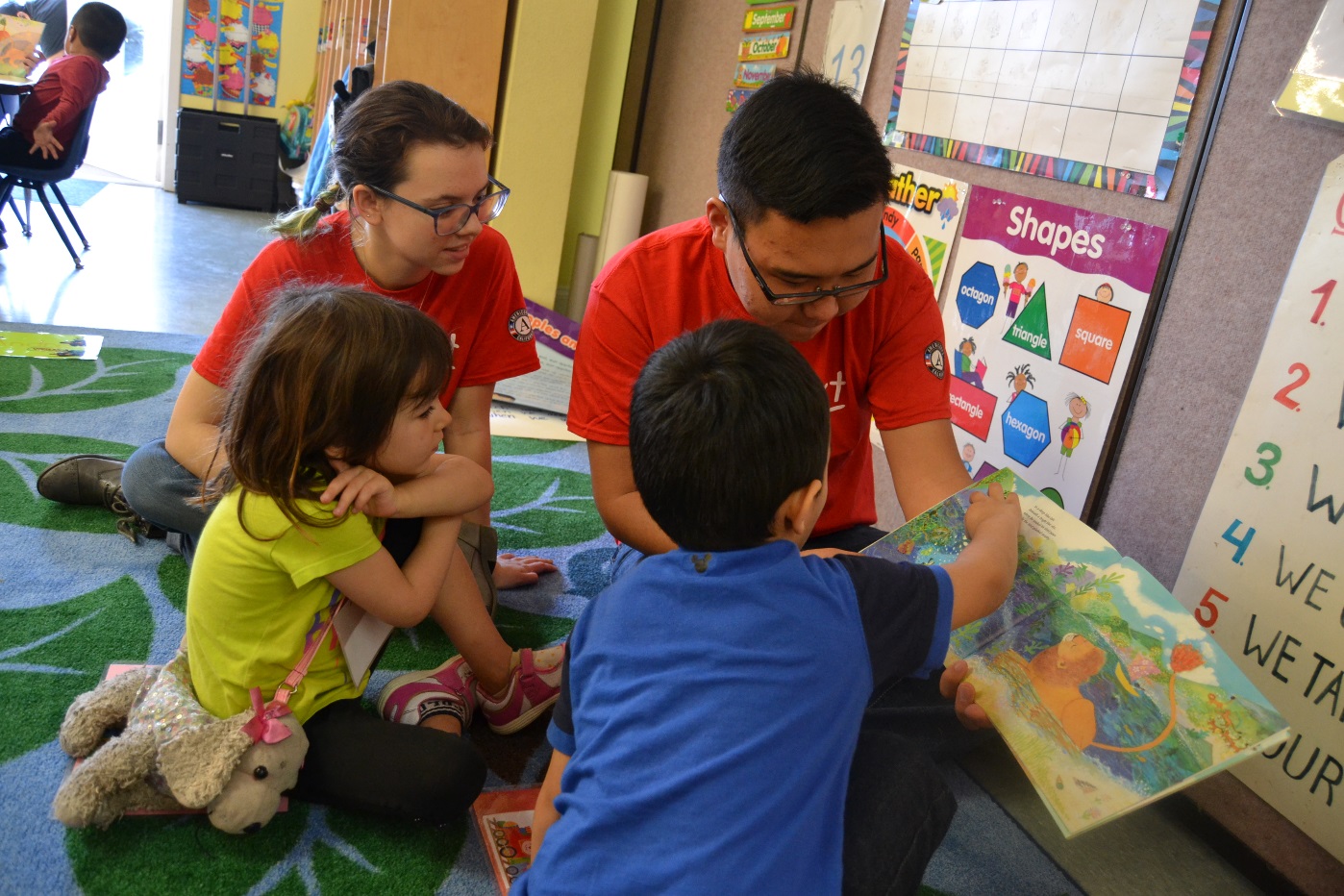
Bessie and David Pregerson Child Development Center/Rayna Jackson
Guadalupe Placencia, director of BPCDC, gives credit to Jumpstart UCLA students for giving children the rare advantage that they need to succeed in the classroom and beyond.
“You can see how our preschoolers are progressing because of the Jumpstart UCLA students,” Palencia said. “The college kids come in wearing their jeans, t-shirts and sneakers ready to go. They get to know all of the children. They come in and sit on the carpet and get dirty with them, which is great because you don’t see a lot of that with teachers.”
This “all-in” approach has been a success. Placencia says that the children who work with UCLA students are not just going into transitional kindergarten or kindergarten, but some even exceed expectations and go directly into the first grade.
Palencia also notes that because BPCDC operates on a limited budget, the services provided by the program are essential to her student’s literacy achievements and social success. If UCLA students were not present in the classroom, the student-teacher ratio would increase, decreasing the one-on-one time students need. An absence of corps members would also severely reduce the assistance given to dual-language learners, who make up a large percentage of her student population.
Jumpstart UCLA: Benefiting students and the community alike
Jumpstart impacts UCLA students just much as it does the community they work within.
“Jumpstart exemplifies the idea of ‘reciprocal benefit’ in that UCLA students ‘get’ as much as they ‘give,’” O’Byrne said.
Throughout the year, students get extensive training and some, like Castro, are selected to be team-leaders who manage a group of five other students in the classroom setting. Team leaders undergo additional leadership training and are responsible for everything from running team meetings to creating supplemental classroom materials and working closely with preschool teachers to organize sessions in the schools.
“We are not only looking for students who can work well with children, but can also work well in a team of their peers,” said Maria Monarrez, Jumpstart UCLA site manager. “Team leaders are selected because they have great attention to detail, event planning, communication and conflict resolution skills.”
In addition to training, many students find there are financial benefits as well. The UCLA Center for Community Learning reports that since the start of Jumpstart in 2009, close to 98 percent of students have been recipients of work-study.
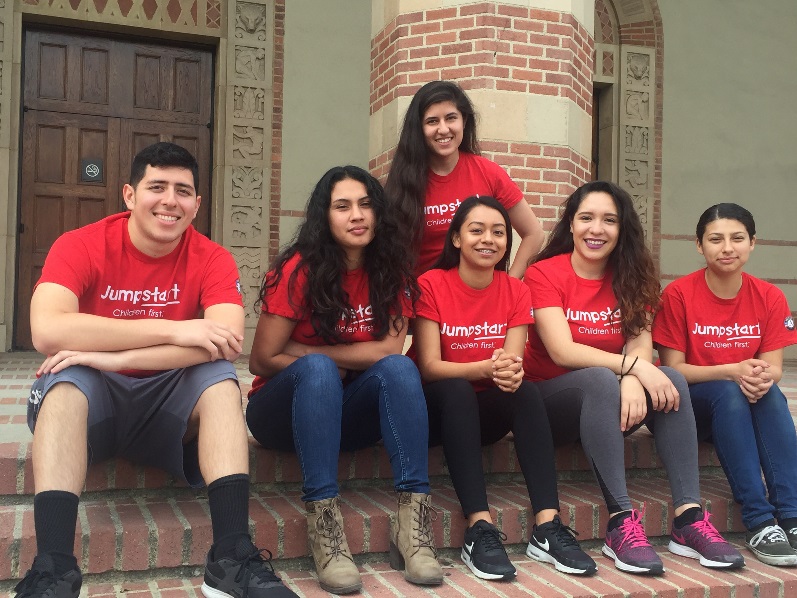
Jumpstart team leader Angelica Castro and her team ‘The Incredibles’/Genesis Ramirez
The UCLA Financial Aid Office Financial Aid confirms that, on average, students receive between $1,500 and $2,000 in work-study monies. However, students who work under “community service” work-study positions like Jumpstart, can potentially get upwards of $5,000 in aid.
“Education is important; however, professional training and being prepared for the work force is also fundamental, because that’s the next step in the student’s life,” said Victor Cisneros, work-study coordinator with the Financial Aid office. “A lot of students use this experience and they go on to put it on their CV or resume and that gets them a foot in the door to other possibilities after school.”
Castro shares that she has received practical training, professional experience and financial aid assistance, and that Jumpstart UCLA has done just as much for her as it has done for the children she works with. She says that her experience in the program has been as a defining part of her undergraduate education. She admits that her first year and a half at UCLA were a struggle. As a first generation student and being away from her family, there were many times she wanted to give up.
“There were times when I thought college wasn’t for me,” Castro said. “I would think, ‘What am I doing here?’ I felt very lost and didn’t feel like I was a part of something to keep me rooted here. And then I joined Jumpstart and felt so relieved. I was a part of something.”
It is that feeling of belonging that Castro wants each of her young students to feel as soon as they step off the bus to attend this year’s Literacy Fair. She gets excited thinking about one of her students who recently told her, “When I grow up, I’m going to wear a Jumpstart t-shirt and be a part of you guys.”
After this year’s event, Castro hopes that more of the children she works with can picture themselves in the same red Jumpstart t-shirts that she and the other corps members wear. But most of all, she hopes that they can see themselves donning UCLA’s iconic blue and gold.
It is through fundraising that the Jumpstart UCLA Literacy Fair is made possible. Those who are interested in volunteering for the event, or donating books, food or in-kind services can contact the Jumpstart UCLA’s Site Manager, Maria Monarrez at mmonarrez@college.ucla.edu.


